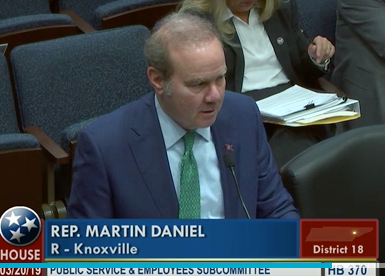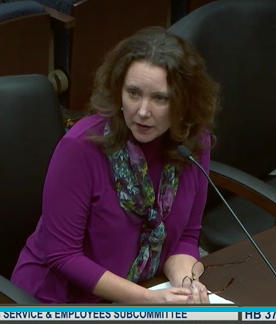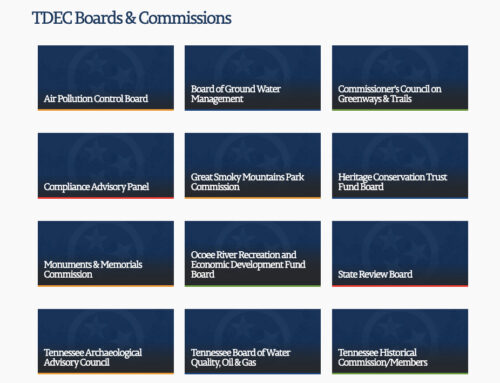“It is we, the Legislature, representatives of the people, who should declare what is a trade secret and what is confidential (about government transactions). Not these private entities who are receiving government benefits.”
State Rep. Martin Daniel, R-Knoxville, in presenting HB 370.
House Bill 370, which would have limited the ability of businesses to claim a government payment to them as confidential under the trade secret law, failed in subcommittee on Wednesday.
While my organization, Tennessee Coalition for Open Government, was disappointed in the vote, the issue got a fair hearing from the subcommittee and allowed us to share with lawmakers a potential problem.
The bill would have changed the interplay between the Tennessee Public Records Act and the law governing trade secrets, and limited a private company’s ability to veto release of government records that show the amount of a government payment or monetary value of government property conveyed to them.

Members on the House Public Services and Employees Subcommittee, many of whom had been contacted by their worried local chambers of commerce, said they were concerned that limiting a company’s ability to keep confidential such payments or financial benefits could put Tennessee on an unequal playing field when recruiting businesses to the state. (See video of the meeting.)
Some were worried about the scope of the bill.
“The concern that I’m trying to get my mind wrapped around is if we do this, as you and others obviously deem is the right thing to do and we all favor transparency, other states in the country are not doing this,” state Rep. David Hawk, R-Greeneville said. “And either putting the information out there prior to or even after the fact when an industry comes to Tennessee, if other states are not doing the same things, it does create a disadvantage.”
The bill, which had been amended from its original version, stated “Notwithstanding any law to the contrary, the monetary value of any government payment, fee or property bestowed by a governmental entity to a private entity must not be deemed to be a confidential trade secret or proprietary information, or otherwise deemed confidential business information, constituting an exception to § 10-7-503(a)(2)(A), unless the transaction falls under a specific exemption as prescribed by state or federal law.”
The bill also said that “(t)his subsection does not require a private entity to disclose information relating to an application submitted to a governmental entity for payment, a fee, or other form of financial benefit.”
Trade secret claim can shield info
State Rep. Martin Daniel, R-Knoxville, who sponsored the bill, said the intent of the bill was to “shine a light on what our government entities are paying for goods and services.”
“I would submit that transparency and accountability in government promotes and instills public trust in government,” Daniel said in introducing the legislation. “However, vague and broad exceptions to the Public Records Act concerning what a private entity might deem to be trade secrets or confidential information can obscure information concerning benefits that are conveyed by government entities to these privately owned recipients.”
“…What we’re trying to do is prevent private entities from declaring information concerning benefits that they receive, prevent them from declaring what is confidential information or trade secrets.
“It is we, the Legislature, representatives of the people, who should declare what is a trade secret and what is confidential (about government transactions). Not these private entities who are receiving government benefits” Daniel said.
Daniel emphasized that if there was already a specific exemption under the law protecting particular payments or conveyance of financial benefits, they would still apply, as would any new exemptions that lawmakers choose to pass.
Google agreement prompts interest
Subcommittee chairman Bob Ramsey, R-Maryville, said that he understood the bill’s impetus came “from an agreement that apparently has been shrouded in mystery with Google” in Montgomery County. “However, we’ve found out that this affects some of our educational institutions as well and some of their endowments.”
State Rep. Harold Love, D-Nashville, asked if the bill would require the Tennessee State University Foundation to disclose what they are paying the manager of their fund to manage the account, noting that he thought the foundations were separate from the university.
“I think that’s a really good question,” Daniel said, “and it’s probably beyond my scope of expertise. I think there is a whole body of law as to what constitutes a government entity subject to the open records act, and what is not. Some of these government entities will create separate 501(c)(3)s and other bodies.”

Tennessee Coalition for Open Government advocated for the bill, and as executive director, I also testified before the subcommittee. Here is an excerpt from that:
I would like to explain how this came about. This issue really came on our radar about two years ago. The Tennessee Public Records Act states that a public record is any record made in connection with official business by a government agency.
Most Tennesseans would assume that this means that how much a government entity pays a private entity is public. And when a government entity grants a company a financial benefit, such as property in a PILOT (payment-in-lieu-of-taxes) agreement, that the value of the PILOT agreement would be public.
But what we have seen is that this has been undercut where businesses have asserted that in fact, the value of the property — and this is what happened with Google in Montgomery County — but the value of the property that they were given by the government to operate on in the PILOT was confidential because Google said if other companies knew how much we were getting from the government they would compete against us more effectively.
And so they were effective in basically removing that from the public record. And that’s really our concern here — the ability of businesses to remove from the public record the value, the amount that is being paid to private entities, or the value of government property that has been assembled using taxpayer funds, the ability of businesses to claim that’s a trade secret and remove that information permanently from the public record where the public doesn’t know that.
And that’s really how it arose.
The language in this would be affirmative language in the Public Records Act that would draw the line in the sand on that.
“I think all of us can by sympathetic to that concept,” Ramsey said. “But this bill seems to be a bit more far-reaching. And I’m getting communication from my chambers of commerce, even though it doesn’t affect them, it does affect recruitment — the atmosphere for Tennessee to recruit from entities outside the state. So it creates a certain atmosphere.”




